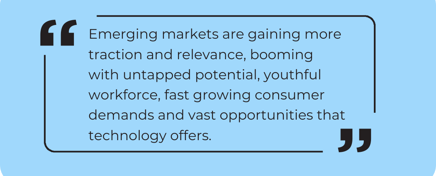Financing Emerging Markets
Summary report by Kigali International Financial Centre following a roundtable discussion which took place at Elevandi Insights during the Singapore FinTech Festival 2023
Unlocking capital for emerging markets
13 May 2024 - As part of the Singapore FinTech Festival 2023, Elevandi Insights convened industry leaders, regulators, and policymakers to engage in a dialogue on digital and sustainable finance.
On 14 November 2023, The Kigali International Financial Centre hosted a roundtable on Financing Emerging Markets that brought together 11 global speakers from both the public and private sector. The discussion served as an open platform to 1) stimulate challenges and barriers of attracting capital in emerging markets, 2) explore innovative financing mechanisms and, 3) develop market-specific strategies.
Understanding the financing challenges

The past year has not been kind to capital flows globally. Global deal volumes for FinTech in 2023 declined about 70% from its peak in 2021. Participants at the roundtable suggested several contributing factors.
Multiple parties agreed that the global economy today is dominated by uncertainty. With increased trade tensions continuing to dominate headlines, such tensions have had a ripple effect on the global economy.
Roundtable participants agreed that such global uncertainties hinder the ability of financial institutions or funds to make big decisions on investments, particularly in higher risk regions. The International Monetary Authority acknowledged last year that these global tensions could trigger capital outflows and threaten financial stability.
Participants also highlighted that there has been a fundamental reset in investors’ mindset on multiple fronts. “The willingness to just put money against ideas on a speculative basis is dramatically diminished,” a participant highlighted. The speakers posited two reasons for this:
1. The validity and short-term viability of many business models have not been proven out, with many businesses that have received investments not delivering what they had promised.2. The high interest rate environment that arose post-pandemic means investors have less incentive to make such risky capital plays.
“If I can take on risk and have my cash on call, why am I going to go and take all this existential business development risk in the hope of an average return of 15%?” , questioned one participant.
 These forces have resulted in a shift in priorities for investors. In the venture asset class, for instance, early-stage funding (Pre-Series A) has become more of a challenge in recent years as the bar has moved quite significantly; a participant illustrated how investors who may previously have been convinced by a business making $1 million in Annual Recurring Revenue, today asking for $2 million.
These forces have resulted in a shift in priorities for investors. In the venture asset class, for instance, early-stage funding (Pre-Series A) has become more of a challenge in recent years as the bar has moved quite significantly; a participant illustrated how investors who may previously have been convinced by a business making $1 million in Annual Recurring Revenue, today asking for $2 million.
Against such forces, emerging markets are disproportionately struggling.
“In the emerging markets, the currencies are depreciating, inflation is increasing…and that will just kill growth. These markets need the growth, and without the growth, they cannot really survive”, one participant highlighted.
As emerging markets raise interest rates to combat rising inflation, funding is becoming increasingly expensive. In addition, emerging markets like those in Africa are often perceived by global investors as a riskier place to invest in.
The opportunity in emerging markets: An African spotlight
Despite the challenges above, emerging markets like those in Africa hold immense potential.
 The African Development Bank Group’s Africa Economic Outlook 2023 finds that the African economy has proven resilient in the face of multiple shocks, such as the tightening of global financing conditions which has reduced the continent’s real GDP growth from 4.8% in 2021 to 3.8% in 2022.
The African Development Bank Group’s Africa Economic Outlook 2023 finds that the African economy has proven resilient in the face of multiple shocks, such as the tightening of global financing conditions which has reduced the continent’s real GDP growth from 4.8% in 2021 to 3.8% in 2022.
FinTech development remains strong. There is much room for growth, particularly since many of the African economies are primarily cash-based, and many parts of the continent are still in the early stages of digitisation. Research by the Boston Consulting Group predicts that Africa is going to be the fastest growing FinTech market between 2023 and 2030, with revenues rising by a whopping 13x (as opposed to a global average of 6x).
Bridging the funding gap: Attracting capital

In closing the roundtable, various participants shared different financing opportunities, other alternative financing, and strategies to attract investors:
1. Rethinking mindsetsBearing in mind the shift in priorities for investors, roundtable participants encouraged firms looking for capital to rethink their mindset. Rather than a ‘growth at all costs’ mentality, one participant urged firms to keep sustainability in mind and to focus on profitability instead.
.png?width=436&height=185&name=_We%20must%20adopt%20a%20fresh%20mindset%2c%20a%20sense%20of%20urgency%20related%20to%20financing%20and%20attracting%20capital%2c%20and%20we%20cannot%20afford%20to%20lose%20momentum.%E2%80%9D%20(1).png)
Another participant suggested that in emerging markets like Africa, early-stage tech firms need to consider how they are going to expand across multiple geographies to achieve the scale that investors today are looking out for. To do so, they proposed exploring merger and acquisition opportunities with larger entities.
2. Seeking opportunities in nascent sectorsWhile payments remain the dominant industry in Africa’s FinTech growth, participants concurred on the need for emerging markets to develop further across other FinTech verticals. One potential avenue highlighted was that of credit provisioning for SMEs. For example, credit provisioning for SMEs and consumers remain the biggest subsector gap in Southeast Asia, according to one participant who highlighted that existing Buy Now, Pay Later solutions are essentially “unsecured consumer lending with no consumer safeguards”.
3. Investing in people.png?width=436&height=160&name=%E2%80%9CIf%20you%20invest%20and%20have%20the%20right%20technology%2c%20but%20not%20the%20right%20people%20to%20run%20all%20these%20and%20bring%20the%20right%20ventures%2c%20you%E2%80%99ve%20done%20nothing.%E2%80%9D%20(1).png) Nurturing the local ecosystem and channelling capital into development local talents will foster innovation and the materialisation of disruption and creativity in the emerging markets. It is in the countries where young people are well-educated and connected that we see the most developed entrepreneurship ecosystems, one participant observed.
Nurturing the local ecosystem and channelling capital into development local talents will foster innovation and the materialisation of disruption and creativity in the emerging markets. It is in the countries where young people are well-educated and connected that we see the most developed entrepreneurship ecosystems, one participant observed.
.png?width=436&height=180&name=%E2%80%9CGovernments%20have%20priority%20in%20ensuring%20that%20the%20necessary%20foundational%20environment%20is%20laid.%E2%80%9D%20(1).png) Governments play a crucial role in ensuring that policies are predictable and that there is an element of certainty to attract private funding. Participants agreed on the public sector’s responsibility to provide an overarching, enabling business environment for attracting private capital.
Governments play a crucial role in ensuring that policies are predictable and that there is an element of certainty to attract private funding. Participants agreed on the public sector’s responsibility to provide an overarching, enabling business environment for attracting private capital.
One way to do so is by investing in the development of digital public infrastructure (DPIs). In Brazil, for instance, the public sector is investing in creating infrastructure that will set a level playing field for private sector actors to develop services and products on top of.
One example of this is PIX, a government-sponsored instant payment infrastructure. In an interview with US-based thinktank The Wilson Center, Brazil’s Deputy Secretary of Digital Government from the Ministry of Economy, Luanna Roncaratti, said that PIX has reduced transaction costs and helps to promote financial and digital inclusion. She added that the infrastructure now has 150 million users and handles US$300 billion worth of transactions monthly.
Deputy Secretary of Digital Government, Ministry of Economy, Brazil, Luanna Roncaratti.
5. Incumbents to take the lead in innovationOne participant highlighted an untapped source of capital for innovating the financial system: incumbent institutions. 
Yet, despite these advantages, many established banks continue to run on legacy technologies. They proposed that banks should take the lead in shifting away from investing in legacy technologies and platforms, and instead, reroute these investments into the next generation of technologies. This can, then, propagate an ecosystem of suppliers, leading to the creation of a vibrant FinTech infrastructure.
6. Capital recyclingSuccessful exits in the private equity and venture capital ecosystems outside developed markets have historically been limited. Rather, what feeds future investment in emerging economies is a tangible return on investments and the ability to extract those returns to reinvest; in other words, capital recycling.
Capital recycling can help to mitigate some investment risk, especially in the face of geopolitical turmoil. Essentially, capital recycling allows investors to better secure their earnings in an uncertain environment, as they can withhold withdrawing their returns until the economy stabilises.
In the meantime, one participant advocated for a more proactive approach to maximise the potential of capital recycling. They illustrated this approach through the example of investing in a carbon credit platform.
In this example, investors would get their returns if the platform were able to successfully generate carbon credit certificates. For this to happen, the platform will need to demonstrate projects that have successfully reduced carbon emissions.
 Investors can play a crucial role in ensuring project success by investing in related verticals. For example, this may involve AgriTech solutions, such as artificial intelligence (AI) tools for predicting adverse weather conditions that could impact crop growth, as well as InsurTech solutions aimed at protecting crops from such weather events. By considering this value chain from the outset, investors can allocate their funds strategically to maximise returns.
Investors can play a crucial role in ensuring project success by investing in related verticals. For example, this may involve AgriTech solutions, such as artificial intelligence (AI) tools for predicting adverse weather conditions that could impact crop growth, as well as InsurTech solutions aimed at protecting crops from such weather events. By considering this value chain from the outset, investors can allocate their funds strategically to maximise returns.
As earlier mentioned, many investors view investing in emerging markets as inherently risky. As such, one participant advocated for the need for homegrown capital, speaking specifically about the African market. Another speaker concurred, emphasising the importance of investors and General Partners (GPs) to be close to their investments.
By being on the ground, investors have a better sensing of happenings on the ground and are better to ascertain risk levels and pinpoint early warning signs, if any.
Additionally, fostering more homegrown capital will send a signal to overseas investors that such emerging markets are viable investment options.

